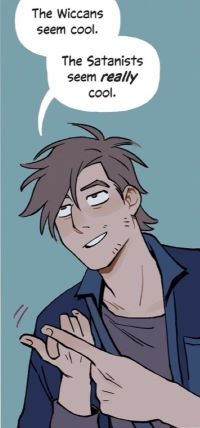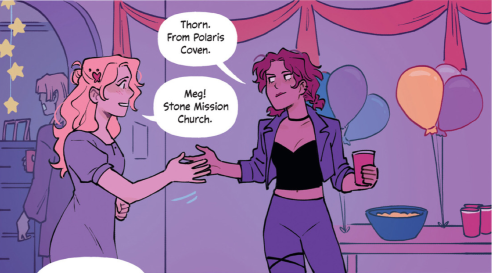Happy Saturday, dear readers! I decided to publish a bonus post today due to something that an acquaintance from an online deconstruction community said over on Threads:
Thoughts on grief & estrangement.
The thing about no contact with a parent is they have basically died.
But society doesn’t have a way to really grieve that.
My uncle died and my health (and said estranged parent) is precluding me from going to the memorial.
I wrote cards to my aunt and cousins this week, sending my condolences.
But before I sent those, some internal work was required, bc my mom has died – but no one really knows that.
Threads post by joyfulsojournr.
What joyfulsojournr said struck a cord with me. This is something that we as a society — especially those of us who like to build religious community — really need some sort of rite for. After all, we have rites for funerals, weddings, births, coming of age, and many other life events. Why not rites to honor cutting ties with someone and mourning the loss of that relationship?
At first, I wrote a draft of a simple solitary rite for grieving the loss of relationship. However, as I thought about it more, I realized this is a moment in people’s lives where they need community recognition of and support for this important and often painful transition in their lives. So i have chosen to expand the rite into something that a kindred or other group might do. I’m including the entirety of this new community-oriented rite in this post.
I will note that this rite is deeply rooted in (my understanding of) Norse mythology and cosmology and draws on that symbolism extensively. As such, this rite won’t meet the needs of everyone. But hopefully it will give even those who do not honor the Aesir and Vanir ideas on how they might develop their own rites to help one another through such a life decision.
The ritual
Participants:
- Mourner (the person cutting ties with a loved one)
- Ritual Leader
- Priest of Thor
- Priest of Freyja
- Priest of Idunna
Note: The ritual leader and three priests can be of any gender. Also, the same person can take on more than one role. However, when possible, the role of each priest should be taken on by someone who has a close connection with that deity.
Items Required
- Two drinking horns or cups filled with a suitable beverage
- An apple or a few apple slices
- An offering bowl (can be excluded if the rite is to be performed outdoors and offerings may be poured directly onto the ground.
Ritual Body
Gather everyone to the ritual space and get everyone’s attention.
Priest of Thor: (Making the sign of Thor’s hammer at each of the four cardinal directions, then toward the sky, then the earth.) Mighty Thor! Hallow this place that we might gather with the gods, the ancestors, and the spirits of land here!
All: Hail Thor! Hallow this place!
Ritual Leader: Gods. Ancestors. Spirits of this land. Please attend this rite that you might witness what we say and do here today. For with this rite, we seek to influence wyrd.
All: Hail to the Powers! Witness our rite and our working of wyrd.
Ritual Leader: Today, we both witness and participate in a shift in wyrd. A member of our community, [Mourner] has chosen to cut someone from their lives. Step forward and name the person.
Mourner: I have chosen to remove [person] from my life. (Mourner may acknowledge who this person is and what relationship there has been between them if they wish.)
Ritual Leader: Have you made this choice of your own free will?
Mourner: I have.
Ritual Leader: And do you believe that this is the best course of action for the sake of your health and well-being?
Mourner: I do. (Mourner may briefly elaborate on why they have made this decision if they wish.)
Ritual Leader: Then as your community in frith with you, we shall honor this choice.
Priest of Thor: As Thor guards the enclosures of men and gods from those chaotic forces that would do harm, I swear to help you maintain your separation from [person] so long as you wish it.
All: So we all swear.
Mourner should take up the first cup or drinking horn at this time.
Priest of Freyja: Freyja, the queen of the Vanir was once separated from her lover, Od. During her separation she cried tears that turned to gold, demonstrating that grief itself is precious and valuable. And while you have chosen to cut off [person], we acknowledge that there will still be grief involved. I invite you to pour out your grief at this time.
Mourner should pour out an offering from the vessel they hold.
Note: The participants should discuss each of the next three offerings and only include the ones relevant to Mourner. For example, if Mourner has no good memories with the person they’re cutting from their life, that offering should be left out.
Priest of Freyja: Even relationships that no longer serve us often had its bright moments. These will lead to memories that need to be grieved. And there may be grief that no such future memories will be created.
Mourner should pour out another offering. Optionally, they may also share some of the memories they are grieving.
Priest of Freyja: Often when we end a relationship, it is because we realized that it was not the kind of relationship we had originally thought of us. Such disillusionment is often painful and we must grieve the loss of what we thought we had as much as we grieve those things that were real.
Mourner should pour out another offering. Optionally, they may also share what some of the shattered illusions the termination of this relationship is forcing them to grapple with.
Priest of Freyja: The termination of a relationship often comes with the loss of hope. Hope that the relationship will improve. Hope that we can somehow fix or salvage it. The loss of that hope deserves to be grieved.
Mourner should pour out another offering. Optionally, they may also share what hopes they had for the relationship up to this point.
Priest of Freyja: Hear us, Queen of the Vanir! Having witnessed [Mourner’s] offering of grief, we acknowledge the pain of her loss and the value of her grief. Like your own tears, let their grief be a precious as gold to you.
All: Hail Freyja! Accept their grief!
Reilgious Leader: Grief is not a one-time experience that can quickly left behind. As your community, we recognize that these offerings are just the start of your grieving journey. We swear to support you as that journey continues.
All: So we swear!
Priest of Idunna: (Picking up the apple or apple slices) As Idunna nourished the gods with her apples and kept them strong, let us nourish, comfort, and strengthen you during this time of change and grieving.
The Priest of Idunna should offer the apple to Mourner, who should then eat it.
Ritual Leader: (Picking up the second cup or drinking horn) Let us all share a drink and toast our love and support to [Mourner].
Hold a one-round sumbel where each participant affirms Mourner’s decision, offers a blessing during their time of grieving, or otherwise demonstrates their support. Mourner should drink from the cup last, offering gratitude to those in attendance and stating their hopes moving forward.
Ritual Leader: Gods! Ancestors! Spirits of this land! We thank you for witnessing this rite. We ask you to continue to bless our community and especially [Mourner] during this time and grief.
All: Hail to the Powers! Thank you for your attendance!
Ritual Leader: This rite is concluded. Let us break together bread in kinship and frith.
Retire to feasting and good conversation.



